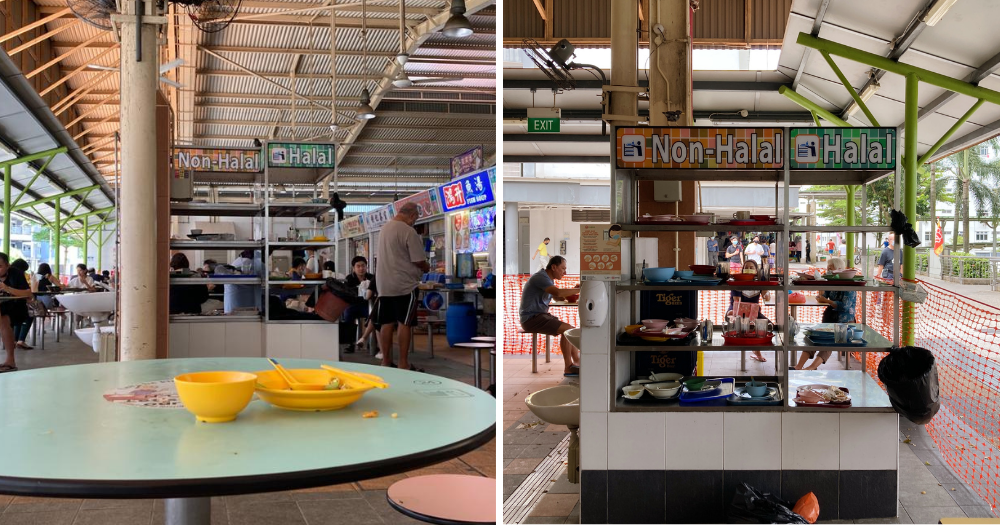Follow us on Telegram for the latest updates: https://t.me/mothershipsg
When I arrived at Ghim Moh Food Centre at 11:35am on Wednesday (Sep. 1) morning, my heart was beating a bit faster than usual, slightly nervous at the thought of needing to approach people to ask them why they didn't clear their trays.
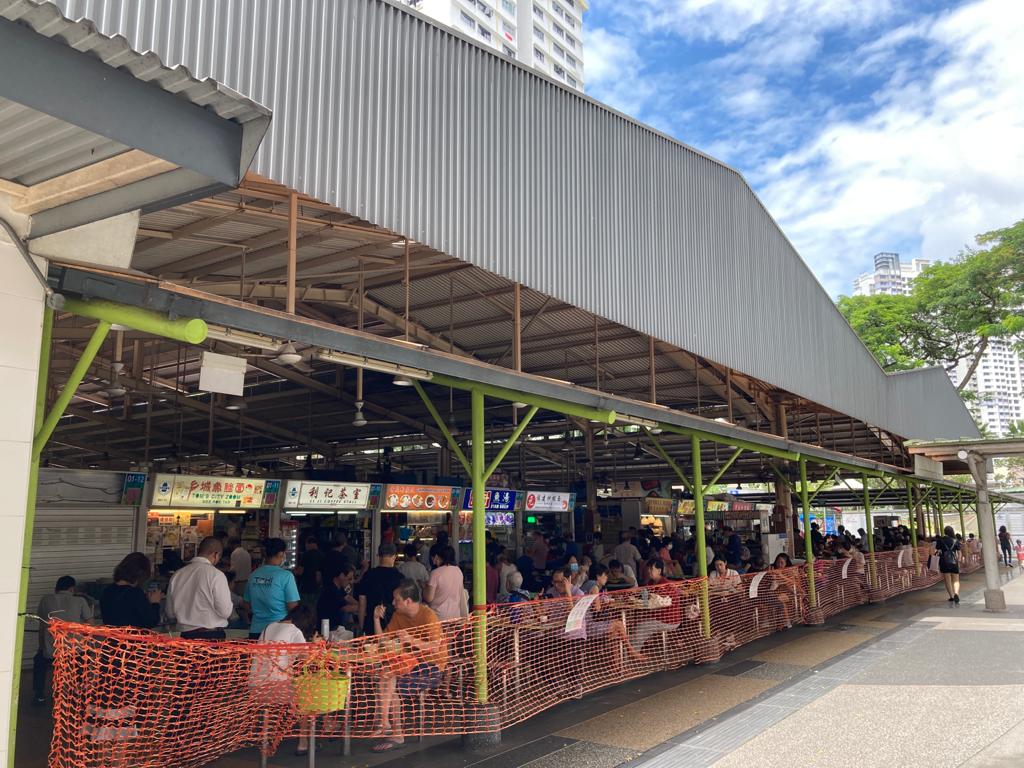 Photo by Jane Zhang.
Photo by Jane Zhang.
It was the first day that the National Environment Agency (NEA) would conduct enforcement actions against people who did not clear their trays and crockery at hawker centres, and I was there to see what things were like on the ground, and if there were still people flouting the rules despite the threat of a written warning, and subsequently a fine.
"Hi, my name is Jane. I'm a writer from Mothership. I'm writing an article about the new enforcement for tray clearance and was wondering if I could ask you some questions...", I muttered to myself, trying to sound friendly enough to avoid an antagonistic conversation.
However, as I walked through the hawker centre, scanning the tables for culprits — I mean, diners — to approach and gently ask why they didn't clear their tray, I found myself pleasantly surprised by the lack of people to approach.
Cleared trays long before the new rules
Instead, one of the first people I noticed was a middle-aged woman neatly stacking her plates on her tray and using a tissue to wipe the table.
Well, I thought, if I couldn't find people who were flouting the rules, I might as well talk to the people who were following the rules and find out why — was it out of fear of the fine?
I whipped out my rehearsed speech and asked the woman, who identified herself as Stephanie, whether clearing her own tray has always been something that she has done.
"Yes," she answered, without missing a beat. "Even way before [the recent announcements]."
Stephanie explained:
"I think it's our own personal responsibility to do that and not depend on the hawkers. It's also good for the next [diners] who are sitting down to eat."
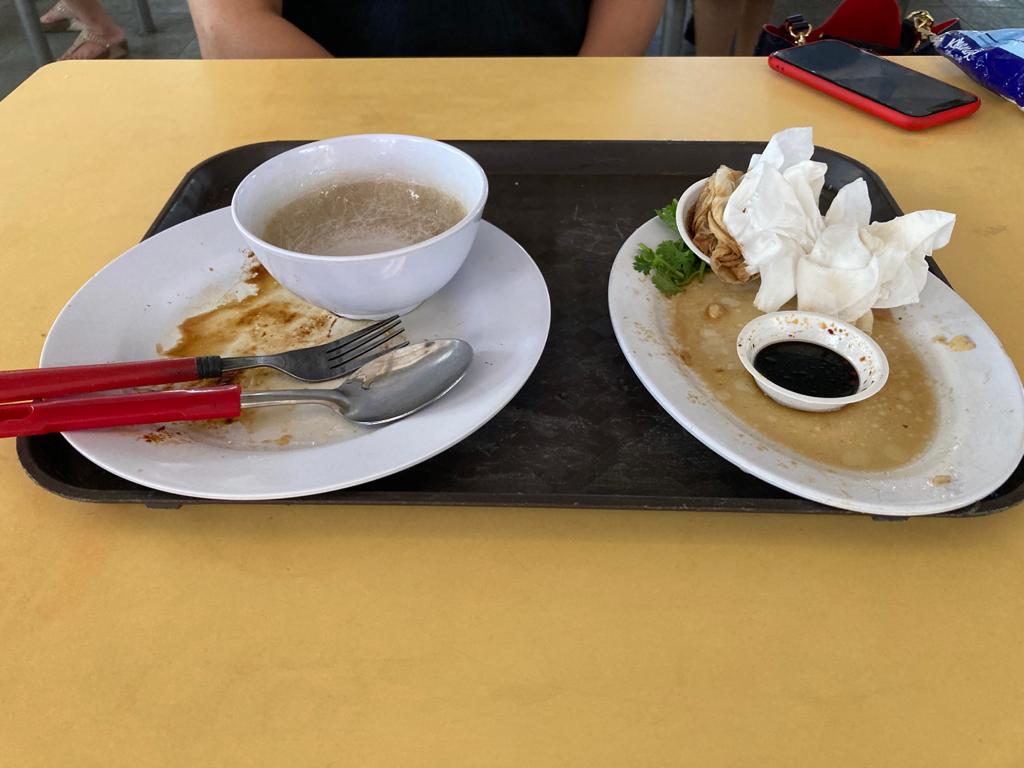 Stephanie's neatly stacked tray that she prepared to clear. Photo by Jane Zhang.
Stephanie's neatly stacked tray that she prepared to clear. Photo by Jane Zhang.
An older woman who I spotted putting her plate away told me that she has been clearing her own crockery and trays "for decades".
She explained that she began the habit when she was still a student and had just begun working in her first job, at McDonald's:
"I seldom ate out. I didn't even know what McDonald's was. Then [when I began working], they told me that it was self-service.
I noticed that it's good; after eating, you serve yourself. I find that it's very good, so I inculcate this to my children: 'Wherever you go, just clean up.'"
She added that this is especially important, given that some cleaners are very elderly.
"Lame excuse[s]"
Curious what she thought of new enforcement actions, I asked her whether she thought it was a good or a bad thing that NEA was implementing fines.
"Actually, [clearing trays] should come naturally," she replied.
"But people, you know the mindset: 'Well, if we [clear our trays], then the cleaners don't have any job.'
I don't see it that way. The way I see it, it's just nice helping other people, helping the elderly."
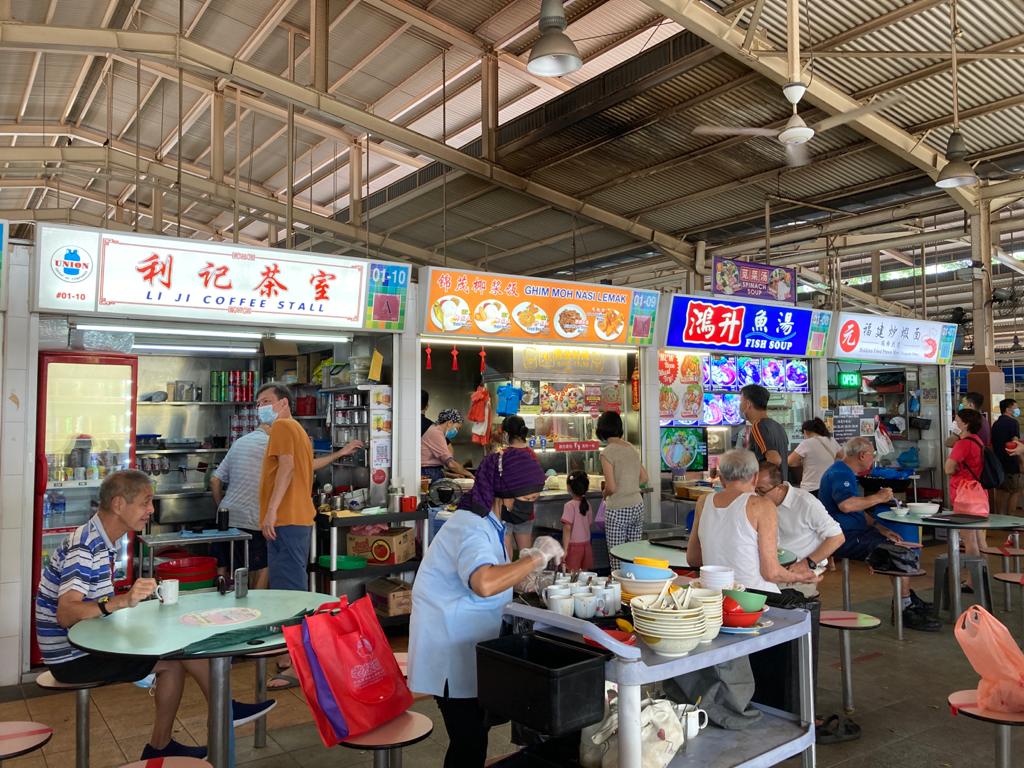 Photo by Jane Zhang.
Photo by Jane Zhang.
A middle-aged man, whom I ended up sharing a table with during lunch, shared his opinion of the sentiment that not clearing trays actually benefits cleaners: "Actually, it's all quite a lame excuse, lah."
When I asked him whether he thought NEA's new enforcement actions to encourage people to clear their trays are good, he said:
"I think no choice. Because, I mean, the government has tried for [many years] (since 2012). That's more than enough time. [...] I think we'll see more people doing it now that the fine is in place."
Still plenty of work that cleaners must do
This idea that diners clearing their own trays will lead to cleaners losing their jobs is a common one, and one echoed by another one of the diners I spoke to.
He explained that he began returning his trays at hawker centres about a month ago, to "try to build up a habit [...] because we don't want to [get] caught off guard" when the enforcement began.
As for why he didn't do so prior to one month ago? He said:
"It's not that we [didn't] want to return; it's that we thought that if we kept on returning, I don't know, the cleaners are going to do what sort of job? So we're providing some employment for them also."
When I asked one of the cleaners clearing trays at a designated tray return station what she thought about this theory, she disagreed, explaining in Mandarin:
"After [trays and crockery are] brought here, we still need to separate them and return them to the stalls. This all takes time, we're still doing work.
And we also need to go around and wipe down the tables. Some people use tissues to wipe, but there are other people who eat very messily, covering the entire table. This is all work that we still need to do."
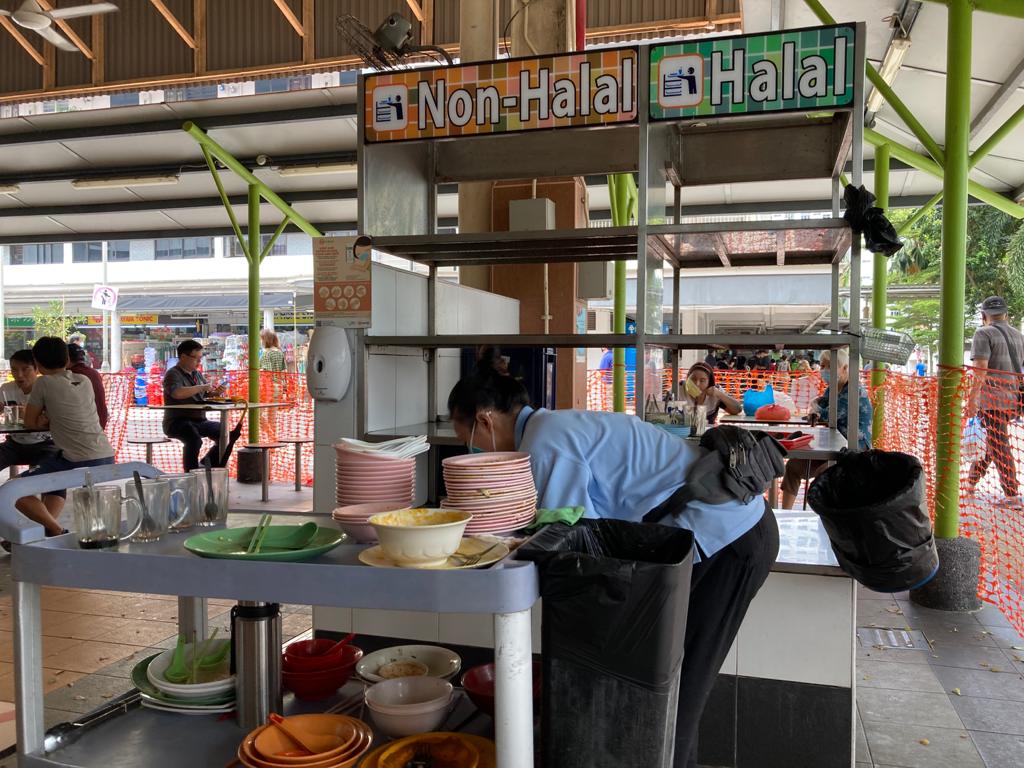 Photo by Jane Zhang.
Photo by Jane Zhang.
NEA has also pushed back against the idea that diners clearing trays could cost cleaners their jobs, adding that demands on cleaners have increased due to the Covid-19 situation:
"Returning one’s dirty tray and crockery will reduce the cleaners’ need to make frequent rounds to clear tables.
They can instead focus on cleaning and sanitising the tables instead, enabling faster turnover of tables during peak mealtimes. This benefits hawkers, diners and cleaners."
The cleaner added that she and other cleaners also need to help clear the trays and tables of the elderly and others who are unable to do so themselves. (Children under the age of 12, the frail elderly, and non-able-bodied individual are excluded from NEA enforcement actions).
She expressed that she was happy that NEA had decided to enforce the regulations, because it will save labour power and allow for a faster turnover between patrons.
When it's busy, she explained, each cleaner might need to manage one whole aisle of tables, which could be quite unmanageable if people did not clear their own trays.
And the work did indeed appear to be cut out for the cleaners. During the busy lunch hour, the tray return stations quickly filled up with trays and crockery for the cleaners to clear, organise, and redistribute to the respective stalls.
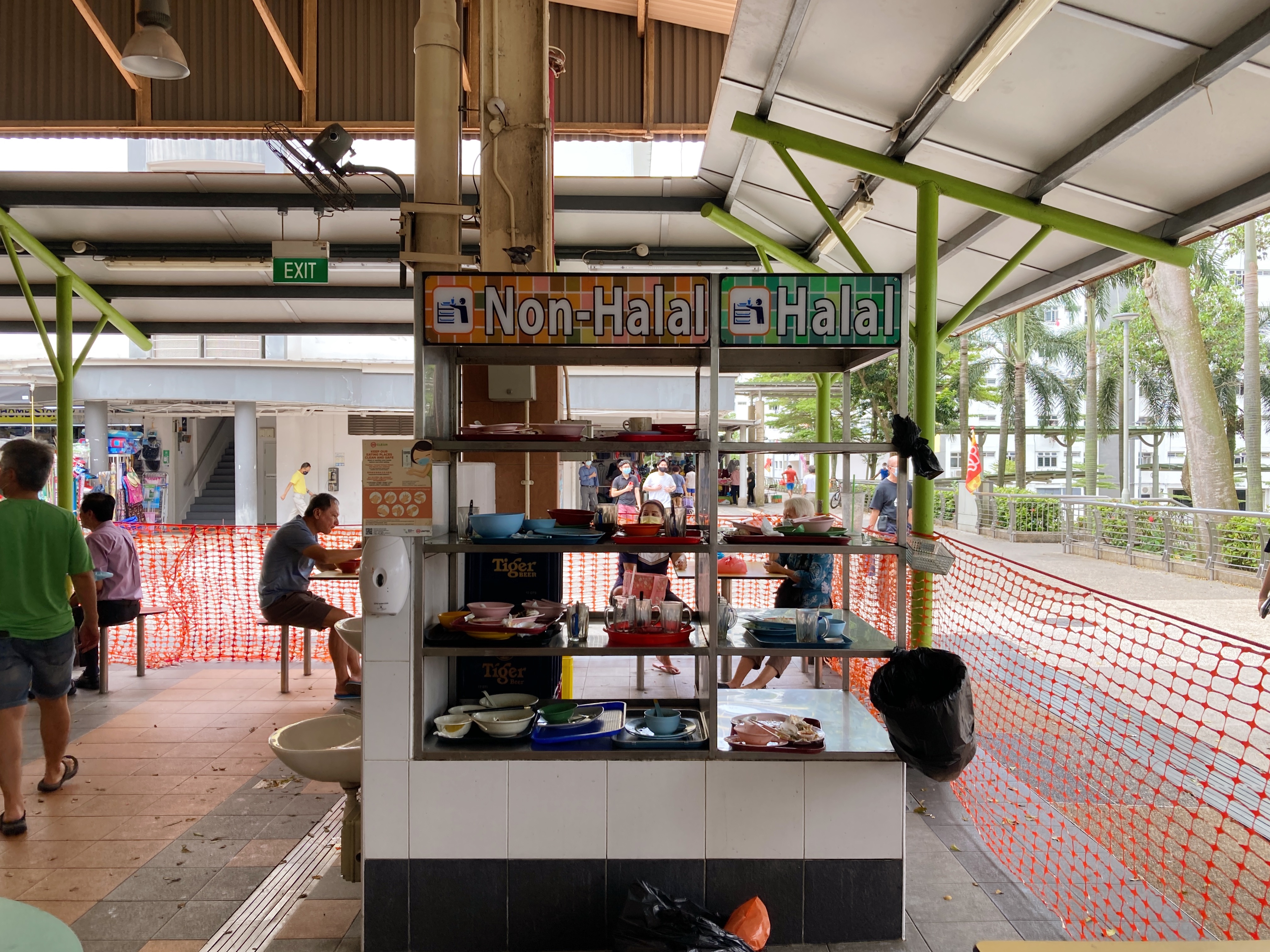 Photo by Jane Zhang.
Photo by Jane Zhang.
Importance of good hygiene
For several diners I spoke to, they cited hygiene as one of the main reasons they cleared their trays.
An elderly auntie and uncle in their 70's who I had spotted not only returning their plates but also wiping down the table with a wet tissue explained in Mandarin that they did so because of hygiene, especially given the pandemic.
"Even without the pandemic, there's still dust!", the auntie stated.
She enthusiastically shared her support for the new NEA enforcement actions:
"It's good! I think the government shouldn't be too open. [...] Then it ends up being unsanitary.
[...] Some people are out of place. Now we can eat healthily and with peace of mind."
Later on, I noticed a middle-aged office lady stacking her plates and bowls onto her tray, and then using her chopsticks and soup spoon to pick up all of the food scraps on the table.
When I spoke to the woman, she admitted that clearing her own tray wasn't a habit, and that often she would stack her tray and put it to the side on the table, but not necessarily bring it back to the tray return station.
However, she recognised the importance of practising good hygiene, particularly with the ongoing pandemic.
She also spoke about the need to have "tray stations [that] are near [and] not piled up":
"If it's very far away, old folks will find it hard to walk."
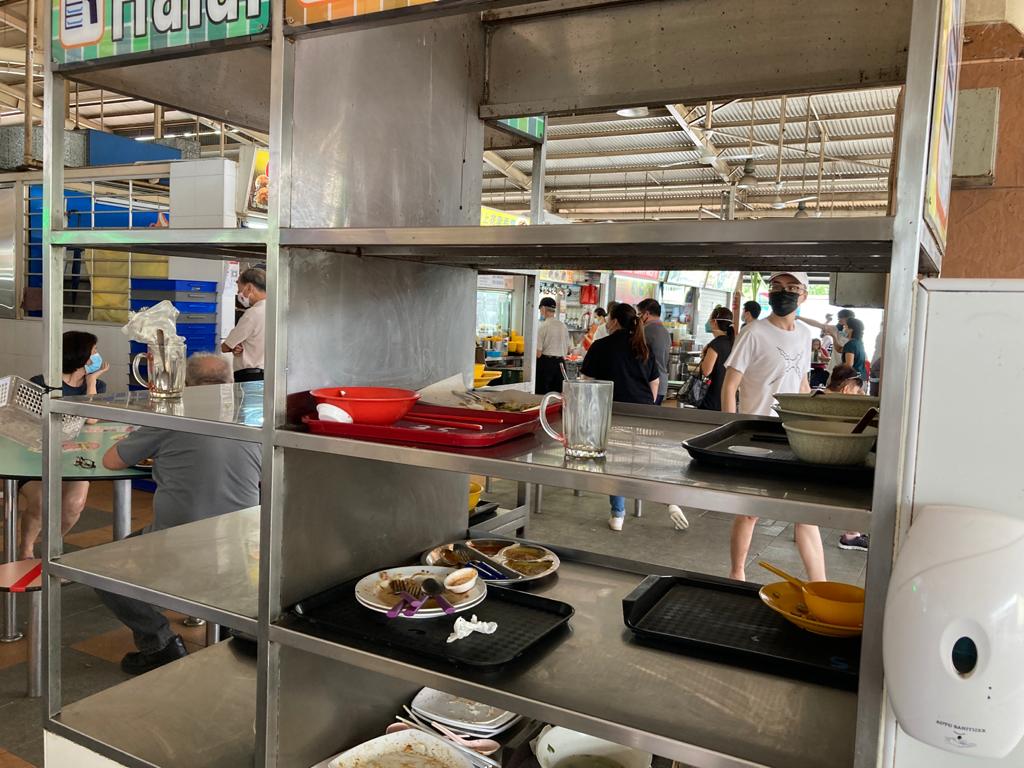 Photo by Jane Zhang.
Photo by Jane Zhang.
More people are clearing their trays, but some still don't
I was surprised that I didn't see a single NEA enforcement officer at the hawker centre during the two hours I spent walking laps around the hawker centre, talking to patrons, and eating lunch. But enforcement officers can't possibly be at every single hawker centre in Singapore so okay, fair enough.
Despite the lack of enforcement officers present, it seemed like the end of the advisory period did cause some positive change in patrons' behaviour.
The cleaner I spoke to told to me that she definitely saw a difference between Tuesday (Aug. 31) and Wednesday (Sep. 1):
"Yesterday, many people were thinking that because there was no fine, it didn't matter. Today, the majority of people have returned their trays."
However, there were still some people who didn't return their trays themselves, she said: "Surely there will be."
As I made one final lap around the hawker centre before heading home, I spotted a few of those uncleared trays.
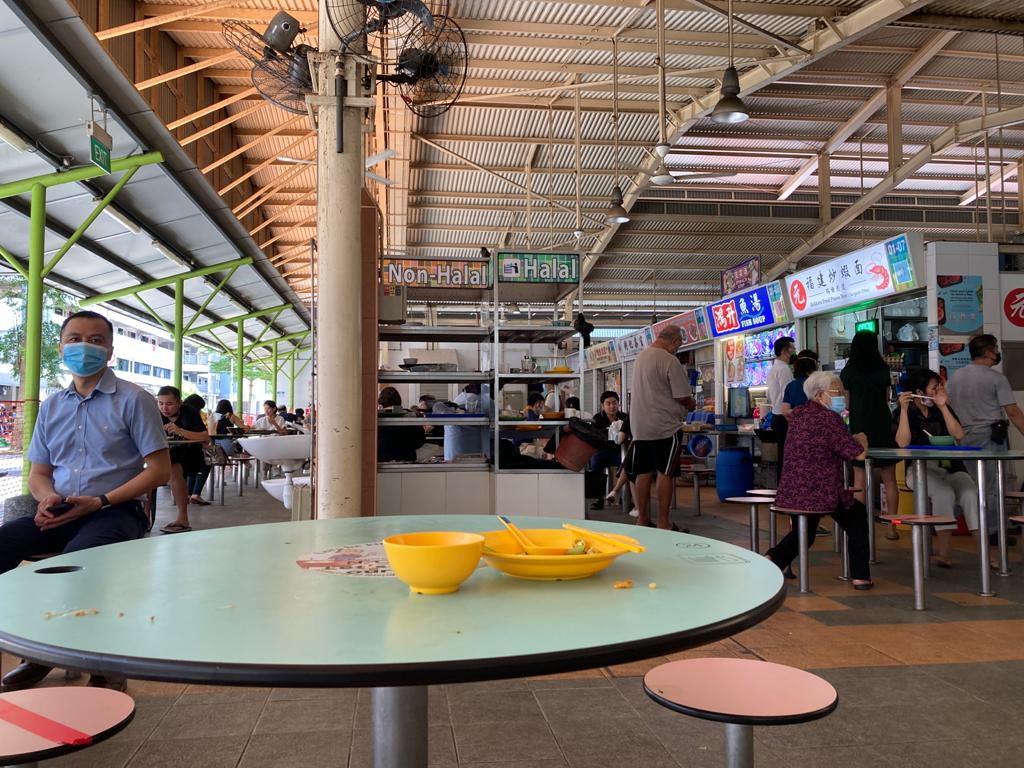 Photo by Jane Zhang.
Photo by Jane Zhang.
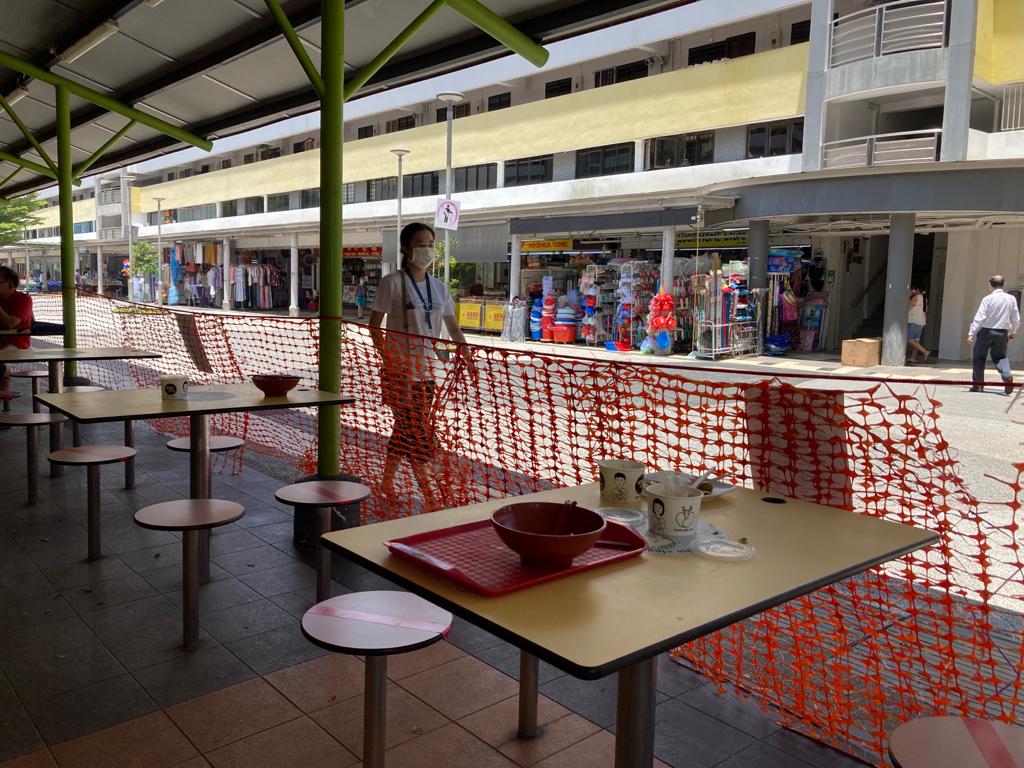 Photo by Jane Zhang.
Photo by Jane Zhang.
Unfortunately, my timing was off and I didn't manage to talk to these people (i.e. use my non-antagonistic introductory script on them).
As I said goodbye to the cleaner I had earlier chatted with, she expressed frustration at the people who left their trays behind.
"There are still some [who don't clear their trays]. [...] Some people feel, 'Even if I don't return, so what? How is this any of my business?' And when I get so busy, I can't stop them."
While my observations on Wednesday could point toward the rather heartening message that more people may indeed be doing their part to clear their trays and crockery, there is still more that we can do.
Top photos by Jane Zhang.
Follow and listen to our podcast here
If you like what you read, follow us on Facebook, Instagram, Twitter and Telegram to get the latest updates.
